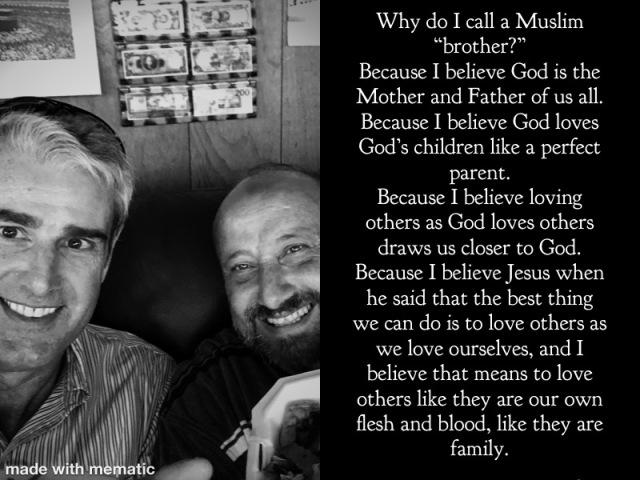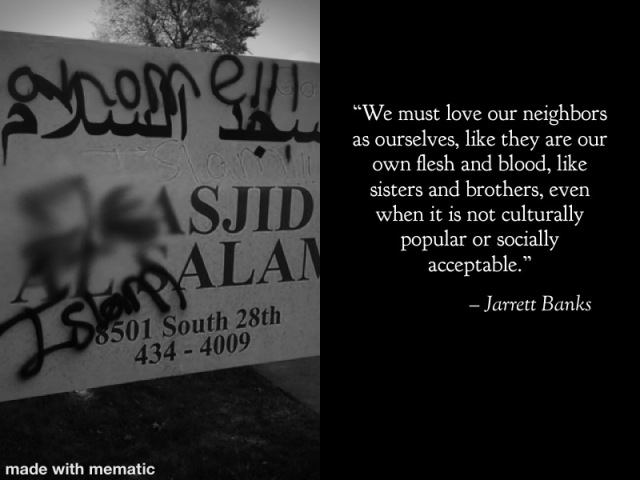
One day, Jesus is confronted by some grumbling Scribes and Pharisees: “Jesus, why do we keep hearing these stories about you hanging out in some very shady places? Rumors are flying all over town about you eating and drinking and hanging out with known sinners!”
“And you claim to be a man of God!”
“Rabbi, if you are a Rabbi, let me tell you something, our God is an awesome God who will punish not only the sinner, but the sinner’s children, grandchildren and great grandchildren. God will strike you down with a lighten bolt, and if not that, send a cancer, a heart attack or maybe a stroke. And, Jesus, you better watch out, because if you get too many sinners in one place, too many sinners at one local restaurant or pub, or in one city or in one nation, God might send a tornado or an earthquake, and take out everyone!”
When Jesus is confronted by these religious people who thought they had all the answers, he responds as he usually does—by telling a story. Here, he tells three stories—one about a lost sheep, another about a lost coin and another about a lost boy. The parable of the lost boy has been commonly referred to as the “Parable of the Prodigal Son.” And he is called “prodigal” for some pretty good reasons.
Growing up in church, my home pastor would often use the dictionary when he came to a point like this in his sermon. I think he defined a word for us every Sunday! He would say, “Now, Webster defines ‘prodigal’ as…” In that spirit, but with a 21stcentury twist, allow me to do the same. Dictonary.com defines prodigal as…
1.wastefully or recklessly extravagant
2.giving or yielding profusely; lavish
3.lavishly abundant; profuse
4.a person who spends, or has spent, his or her money or substance with wasteful extravagance.
The youngest son had the gall to demand his inheritance so he could leave home. Demanding his inheritance meant that he had come to this point in his life where he did not mind regarding his father as being deceased. “I want my inheritance!” “Daddy, I want to live my life as if you were dead!”
Then the surprising part, the father hands it over to the boy who slips into a “distant country” where he wasted every red cent on selfish, wild living—thus, the designation “prodigal”— reckless, lavish, wasteful, extravagant.
After he spends all that he has, there is a famine and the young boy found himself in great need so found a job feeding pigs…
“Of course there is a famine,” says the religious leaders! That is what we are trying to tell you! A famine! That is brilliant! Oooh. God is soooooo good. I bet that boy starves to death! Or at least gets a bad case of salmonella from eating with the pigs. And serves him right! A just punishment for a prodigal—one who had everything only to recklessly lose everything. Death from lack! Death from scarcity! What wonderful irony.”
Jesus continues… “But there in great need, desiring to eat and drink with the pigs, the boy decides to goes back to the father and beg forgiveness…”
“Yeah, good luck with that!” the religious leaders howl, laughing at such a ridiculous scenario!
However, we know the rest of the story…
“And when he was “a long way off,” the father saw him and ran and embraced him. Think about this. How did this father see him “a long way off?” It is certainly not because this father was busy going on with his life. But because the father had been looking for him.
Some of my fondest childhood memories are sitting on the front porch of our home with my brother and my sister, waiting and watching for Daddy to return from work. We would position the chairs on the porch at just the right angle so if we squinted and strained hard enough, we could see through our dogwood trees and our neighbors’ crepe myrtles to get a glimpse of Daddy’s Green Ford LTD almost a half a mile away. Then we would be ready to run to pounce on Daddy to welcome him home. As soon as he got out of the car I would jump on his back, while my sister and brother would grab his legs. On a good day, if we could muster just enough leverage, Daddy would fall into the grass where we would lavish him with hugs and kisses like three little puppy dogs. Mama, used to to get on us. She’d remind us how tired Daddy was from working all day, and how one day when he drove up and saw us running and screaming towards the driveway, he was going to just keep going down the road! I think she was just jealous.
Every day this father sat on his front porch, gazing down the road, watching and waiting, hoping and praying, grieving for his boy to return home. And while he was still a long way off, he was filled with compassion, and he started running! He ran and ran to meet his child, throw his arms around him and kissed him profusely.
I wonder how long the father waited for his dead son’s homecoming. I wonder why the father waited. For all he knew, his son was dead. Can’t you just hear his concerned friends and neighbors, or maybe even his pastor telling him: “Old man, its time for you to move on. You’ve got to get past this. Face the facts. He’s not coming back. You got to get over it. You have to go on living your life. Concentrate on your older boy who’s still here with you.” But the father still waited and watched, hoped and prayed and grieved.
And he really did not know that his son was still alive. A young kid with a pocket full of cash first time away from home traveling alone was an easy target to any would be thieves and murderers. Remember the story of the Good Samaritan? Still the father patiently and you might say recklessly waited. Everyday he kept looking down the road in front of his house. Straining to see, hoping to see, his son coming home.
Then the reunion! The biggest, most extravagant homecoming party you’ve ever seen! The sandals, the ring, the robe, the best one! The calf, the fattest calf! All of the stops pulled out, for this son who was thought to be dead is now alive, lost and is now found.
And the religious leaders are left scratching their heads. Still grumbling and complaining, ranting and raving, now with the older son. Listen how the older son talks about his brother: How can you do this for “this son of yours?” “How can you do this, not for ‘my brother,’ but for this one, as far as I am concerned is still in some distant country?”
This is when it dawns on us. We thought this was a story of a prodigal son, when in reality, it turns out to the story of a prodigal father. It is a story of a very “reckless” “profuse” “extravagant” and “excessive” love. For when the boy left home, the father recklessly gave him his inheritance.
And while the boy was gone into the far country, his friends and neighbors would say that the father recklessly waited. And when the boy at last returned, the father recklessly threw a huge party, holding nothing back for himself. The father loved his son recklessly when he left home, he loved him recklessly while he was away from home and he loved him prodigally when he returned home.
The good news is that is how our God loves each one of us. Our God is a God who, when it comes to love, holds nothing back. God’s love for us is extravagant, excessive, relentless, even reckless. The one thing that this story reveals is that God’s love for us is profusely prodigal.
This is why I will never apologize for loving others in a way that some religious folks would characterize as “excessive.” For my God is profusely prodigal in God’s desire to draw all of us unto God’s self. God is relentlessly radical to have us in God’s arms so God can shower us with divine kisses. As the ranting of the religious leaders and the anger of the older brother reveal, it was this prodigal love that sent Jesus to the cross.
Perhaps the most prodigal statement ever made was made from the cross… “Forgive them, for they know not what they do.” Then, like a father, turning over his property before he dies, giving away his life, to children who are undeserving, to people who are known sinners, Jesus died.
And the watching and the waiting and the grieving continues…
Let us pray…
God forgive us for the sin of the older brother, the sin of Pharisees and Scribes, forgive of our desire to distant ourselves from those in our family, in our community, in our world we consider to be sinners. And forgive us for yearning that you somehow distant yourself, turn your back on, and forsake some, forgive us of our racism or classism or simple arrogance that hopes with the Scribes and Pharisees that you are an unforgiving God who punishes your wayward children and their offspring. Forgive us for believing that your love is anything but profusely prodigal.




